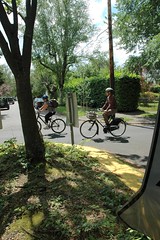
Portland-based Upstream Public Health has just released an important new statewide study that draws a clear connection between transportation policy decisions and people’s health.
The study — Oregon’s first-ever statewide Health Impact Assessment (HIA) — was commissioned by Upstream and funded by the Northwest Health Foundation. Upstream collaborated with Oregon Health Sciences University (OHSU) and an advisory committee made up of a diverse range of experts from the planning, health, transportation engineering, and advocacy fields.
“Why do we routinely assess how a bridge or a highway impacts air quality, but fail to take the next step of estimating how many kids will get asthma as a result?”
— Mel Rader, project director
The study looked at how 11 of Governor Kulongoski’s proposed policies* to reduce vehicle miles traveled (VMT) and meet established greenhouse gas emissions goals would benefit or harm the well-being of Oregonians. (*those policies include things like increasing costs for driving single-occupancy vehicles, improving public transit, and investing in bike/ped infrastructure).
In a statement about the study released yesterday, Upstream noted:
“The Oregon legislature is considering a substantial shift in how it plans and invests in the state’s transportation system as part of an effort to promote alternatives to driving. The study… found that reducing VMT doesn’t just help the environment — it also has significant health benefits in general.”
This may sound obvious to many of you, but in the game of politics, it’s imperative to have a credible and comprehensive study to help make the point with legislators.
The project director who oversaw the study, Mel Rader, had some choice words for the status quo,
“Transportation policy affects our health, and it is high time we carefully examined how our highways affect our lungs and waistlines… Why do we routinely assess how a bridge or a highway impacts air quality, but fail to take the next step of estimating how many kids will get asthma as a result?”
Southeast Portland Rep. Jules Bailey, who has already shown himself as an ardent supporter of non-motorized transportation and who sits on the House Transportation Committee in Salem said, “This isn’t just good for the planet and our health — it costs less and is good for our economy.”
Here are the study findings (emphasis mine):
- Implementing a combination of policies is the best way to promote the positive health benefits of alternative forms of transportation.
- Creating affordable neighborhoods that are high-density, mixed-use, and highly connected will make people more active, decrease air pollution, and reduce car crash fatalities.
- Employer parking fees would promote health more than a gas or a vehicle-miles-traveled tax because it would actually shift people away from driving to public transit.
- Driving-related taxes may disproportionately impact low-income, elderly or disabled individuals. If taxes are put into place, significant revenues from them should be re-invested in low-income communities through strategies such as improving access to public transit and building affordable housing in centrally-located neighborhoods.
This study’s findings come at a perfect time. Down in Salem, advocates are scrambling to make sure that the Governor’s Transportation Bill (HB 2001) includes adequate funding for non-motorized transportation. So far, there has been no mention of increased bike funding in the bill and advocates have struggled through a legislative session that has not been kind to bikes.
The BTA is hopeful that upcoming versions of the bill will include a non-motorized funding pot and they expect new amendments to be released any day now.
— You can learn more information about the study, and download fact sheets and the executive summary at UpstreamPublicHealth.org.


